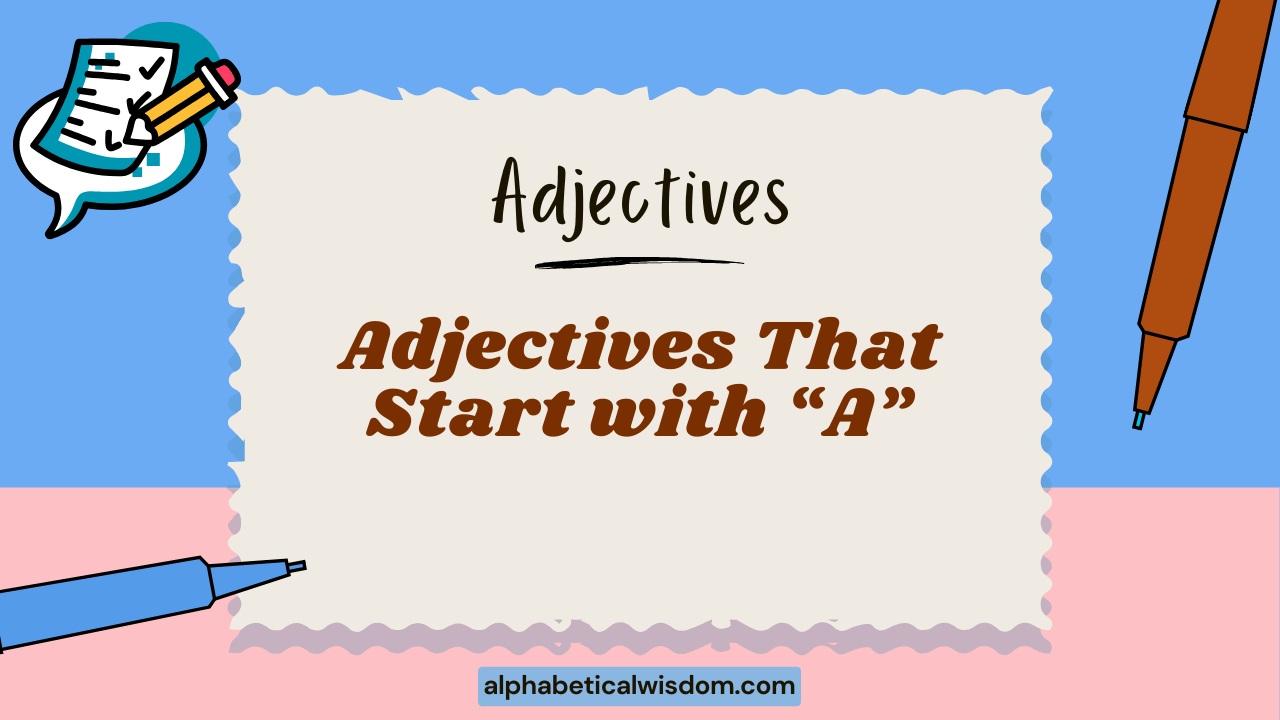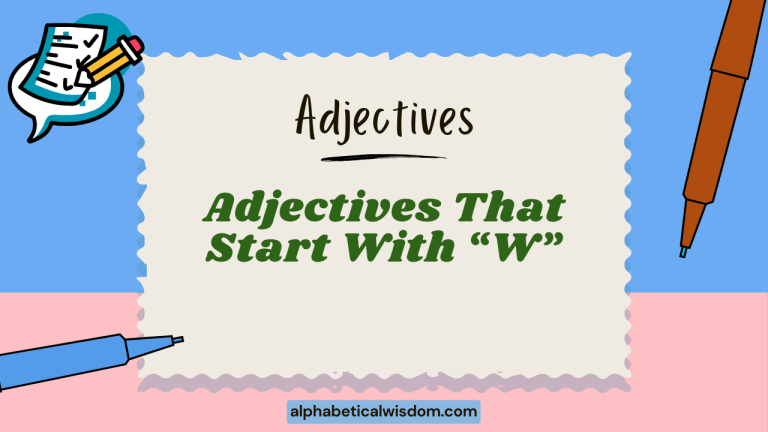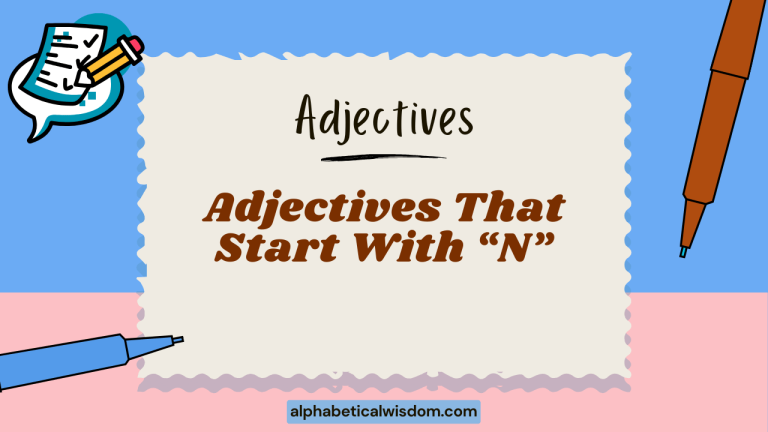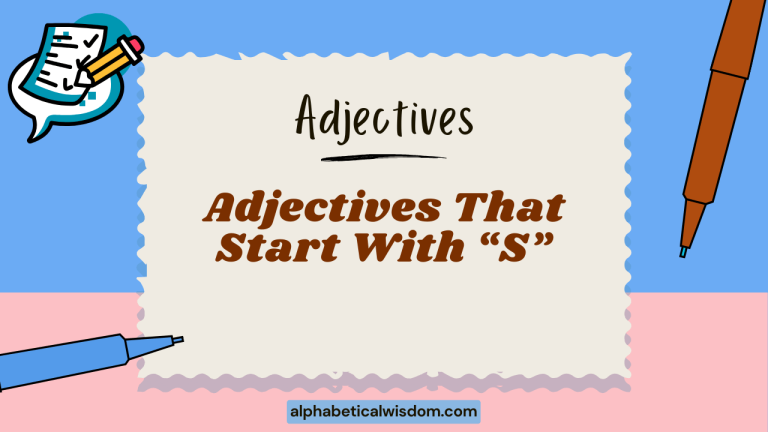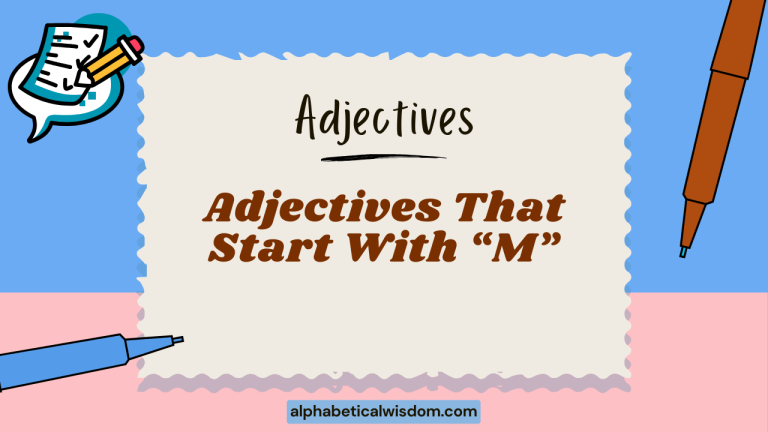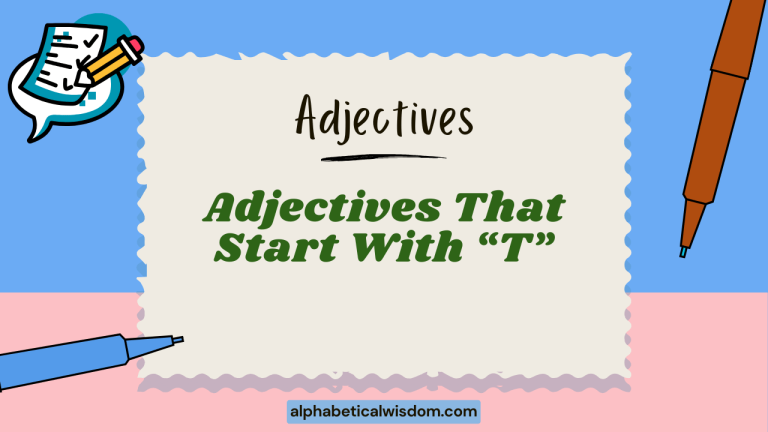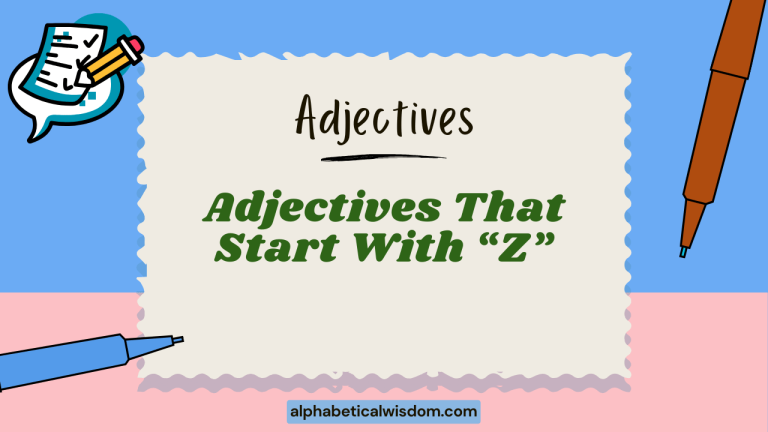Adjectives That Start With A: A Comprehensive Grammar Guide
Adjectives are the colorful building blocks of the English language, adding depth and detail to our descriptions. Mastering adjectives, particularly those starting with the letter ‘A,’ enhances your ability to communicate effectively and precisely.
This article provides a comprehensive guide to adjectives that start with ‘A,’ covering their definitions, usage, and structural nuances. Whether you’re a student, an English language learner, or simply someone who loves language, this guide will equip you with the knowledge to use ‘A’ adjectives with confidence and accuracy.
This guide will explore a wide range of adjectives, from the common to the more obscure, providing examples and exercises to solidify your understanding. By delving into the world of ‘A’ adjectives, you’ll not only expand your vocabulary but also gain a deeper appreciation for the richness and versatility of the English language.
So, let’s embark on this linguistic journey and unlock the power of ‘A’ adjectives!
Table of Contents
- Definition of Adjectives
- Structural Breakdown of Adjectives
- Types and Categories of ‘A’ Adjectives
- Examples of ‘A’ Adjectives
- Usage Rules for ‘A’ Adjectives
- Common Mistakes with ‘A’ Adjectives
- Practice Exercises
- Advanced Topics
- FAQ
- Conclusion
Definition of Adjectives
An adjective is a word that modifies a noun or pronoun, providing more information about it. Adjectives describe the qualities, characteristics, or states of being of the nouns they modify.
They answer questions like “What kind?”, “Which one?”, “How many?”, or “How much?” Adjectives play a crucial role in making our language more vivid and descriptive, allowing us to paint a clearer picture with our words.
Adjectives can be classified based on their function. Descriptive adjectives describe the qualities of a noun (e.g., beautiful, ancient). Proper adjectives are formed from proper nouns (e.g., American, Asian). Quantitative adjectives specify the quantity or amount of the noun (e.g., abundant, adequate). Understanding these classifications helps in using adjectives correctly and effectively.
The primary function of an adjective is to add detail and specificity to a noun. Consider the difference between “a car” and “a red car.” The adjective “red” provides additional information, making the description more precise. Adjectives are essential for creating engaging and informative writing.
Structural Breakdown of Adjectives
Adjectives typically precede the noun they modify, but they can also follow a linking verb (e.g., is, are, was, were, seems). When an adjective comes before a noun, it is called an attributive adjective. For example: “The ancient castle stood on the hill.” When an adjective follows a linking verb, it is called a predicative adjective. For example: “The castle is ancient.”
Adjectives do not change form to agree with the noun they modify in English, unlike some other languages. This makes them relatively straightforward to use. However, some adjectives can be modified by adverbs to indicate the degree of the quality they describe (e.g., very ancient, extremely abundant).
The order of adjectives is also important. While there is no strict rule, native English speakers tend to follow a general pattern: opinion, size, age, shape, color, origin, material, and purpose. For example, “a beautiful large old round red American wooden dining table.” While this sounds a bit unnatural with so many adjectives, it illustrates the typical order.
Types and Categories of ‘A’ Adjectives
Adjectives that start with ‘A’ can be categorized into several types based on their function and meaning. These categories include descriptive adjectives, proper adjectives, and quantitative adjectives.
Understanding these categories will help you use ‘A’ adjectives more effectively and appropriately.
Descriptive Adjectives
Descriptive adjectives describe the qualities or characteristics of a noun. They provide information about the appearance, personality, or other attributes of the noun. Examples include able, adorable, adventurous, and aggressive. These adjectives help to create a more vivid and detailed picture in the reader’s mind.
Descriptive adjectives are essential for effective communication because they allow us to convey specific and nuanced information. By choosing the right descriptive adjective, we can express our thoughts and ideas with greater clarity and precision.
Proper Adjectives
Proper adjectives are formed from proper nouns and describe something related to that noun. They are always capitalized. Examples include American (from America), Asian (from Asia), and Australian (from Australia). Proper adjectives are used to indicate origin, nationality, or affiliation.
Proper adjectives are crucial for identifying the specific source or origin of something. They help to distinguish between general characteristics and those that are specific to a particular place, person, or thing. For example, “American cuisine” refers specifically to the food of the United States.
Quantitative Adjectives
Quantitative adjectives indicate the quantity or amount of a noun. They answer the question “How many?” or “How much?” Examples include abundant, adequate, and all. These adjectives provide information about the number or amount of the noun being described.
Quantitative adjectives are essential for conveying precise information about quantities. They help to avoid ambiguity and ensure that the reader understands the exact amount or number being referred to. For example, “abundant resources” indicates that there is a large quantity of resources available.
Examples of ‘A’ Adjectives
To better understand how ‘A’ adjectives are used, let’s look at some examples organized by category. These examples will illustrate the different ways in which ‘A’ adjectives can be used to describe nouns and pronouns.
Descriptive Adjectives Examples
Descriptive adjectives provide details about the qualities or characteristics of a noun. The following table provides examples of descriptive adjectives that start with ‘A,’ along with example sentences.
| Adjective | Example Sentence |
|---|---|
| Able | She is an able swimmer. |
| Adorable | The puppy is absolutely adorable. |
| Adventurous | He is an adventurous traveler. |
| Aggressive | The dog’s aggressive behavior worried the neighbors. |
| Agile | The agile gymnast performed breathtaking feats. |
| Alert | The alert guard noticed the suspicious activity. |
| Ambitious | She is an ambitious student with high goals. |
| Amusing | The comedian told an amusing story. |
| Ancient | The ancient ruins attracted many tourists. |
| Angry | The angry customer complained to the manager. |
| Anxious | She felt anxious before the exam. |
| Appetizing | The food smelled incredibly appetizing. |
| Artistic | He has an artistic flair for painting. |
| Attentive | The attentive waiter provided excellent service. |
| Attractive | She wore an attractive dress to the party. |
| Audacious | The company made an audacious move to expand into a new market. |
| Authentic | The restaurant served authentic Italian cuisine. |
| Available | Tickets are still available for the concert. |
| Average | The average temperature in July is 25 degrees Celsius. |
| Aware | He was aware of the risks involved. |
| Awful | The weather was awful during our vacation. |
| Amiable | The amiable shopkeeper always greeted customers with a smile. |
| Accurate | The report provided an accurate account of the events. |
| Actual | This is the actual document you requested. |
| Adaptable | She is an adaptable employee who can handle various tasks. |
| Addictive | The game was so addictive that he played for hours. |
| Adequate | We have adequate supplies for the journey. |
| Admirable | His dedication to the project was truly admirable. |
| Adept | She is adept at handling difficult situations. |
The table above showcases how descriptive adjectives, starting with ‘A’, enhance our ability to provide detailed and specific information about the qualities of nouns. These adjectives cover a wide range of characteristics, from physical attributes to personality traits, enriching our language and communication.
Proper Adjectives Examples
Proper adjectives are derived from proper nouns and indicate origin, nationality, or affiliation. The following table provides examples of proper adjectives that start with ‘A,’ along with example sentences.
| Adjective | Example Sentence |
|---|---|
| American | She is an American citizen. |
| Asian | The restaurant serves Asian cuisine. |
| Australian | He has an Australian accent. |
| Arabian | The Arabian desert is vast and beautiful. |
| Argentinian | She is an Argentinian tango dancer. |
| African | The African savanna is home to many animals. |
| Alaskan | He went on an Alaskan cruise. |
| Albanian | The tour guide spoke Albanian fluently. |
| Algerian | The ambassador is Algerian. |
| Andorran | She enjoyed the Andorran scenery. |
| Angolan | The company has Angolan subsidiaries. |
| Antiguan | He is an Antiguan cricket player. |
| Armenian | The Armenian alphabet is unique. |
| Austrian | The composer wrote many famous Austrian waltzes. |
| Azerbaijani | She is studying Azerbaijani history. |
This table provides a clear illustration of how proper adjectives are derived from proper nouns. These adjectives are capitalized and are essential for specifying the origin, nationality, or affiliation of a noun.
By using proper adjectives, we can convey precise information about the source or background of something.
Quantitative Adjectives Examples
Quantitative adjectives indicate the quantity or amount of a noun. The following table provides examples of quantitative adjectives that start with ‘A,’ along with example sentences.
| Adjective | Example Sentence |
|---|---|
| Abundant | There is an abundant supply of water. |
| Adequate | We have adequate resources for the project. |
| All | All the students passed the exam. |
| Any | Do you have any questions? |
| Another | I’ll take another slice of pizza. |
| Additional | We need additional information to complete the report. |
The table above illustrates how quantitative adjectives specify the amount or quantity of a noun. These adjectives are essential for providing precise information about numbers and amounts, helping to avoid ambiguity and ensure clear communication. They range from indicating a large quantity (abundant) to referring to a specific number (any).
Usage Rules for ‘A’ Adjectives
Using adjectives correctly involves understanding their placement, modification, and agreement. While English adjectives do not change form to agree with the noun they modify, there are still rules to follow to ensure proper usage.
Placement: As mentioned earlier, adjectives usually precede the noun they modify (attributive position) or follow a linking verb (predicative position). For example: “The ancient castle” (attributive) vs. “The castle is ancient” (predicative).
Modification: Adjectives can be modified by adverbs to indicate the degree of the quality they describe. For example: “Very able,” “extremely adorable.” The adverb usually precedes the adjective.
Order: When using multiple adjectives, follow the general order: opinion, size, age, shape, color, origin, material, purpose. This order ensures that the adjectives flow naturally and are easily understood.
Exceptions: Some adjectives have specific rules or limitations. For example, some adjectives can only be used in the attributive position (e.g., elder in “my elder brother”).
Comparative and Superlative Forms: Many adjectives can form comparative and superlative degrees to indicate different levels of intensity. For shorter adjectives, use “-er” and “-est” (e.g., abler, ablest). For longer adjectives, use “more” and “most” (e.g., more adorable, most adorable).
Common Mistakes with ‘A’ Adjectives
Even experienced English speakers can make mistakes when using adjectives. Here are some common errors to watch out for, along with correct examples.
Misplaced Adjectives: Placing an adjective in the wrong position can change the meaning of the sentence.
- Incorrect: “He saw an adorable dog running quickly.” (implies the dog is running adorably)
- Correct: “He saw an adorable, quickly running dog.” (implies the dog is adorable, and running quickly)
Incorrect Order of Adjectives: Using the wrong order of adjectives can sound unnatural.
- Incorrect: “a red big car”
- Correct: “a big red car”
Using Adjectives as Adverbs: Confusing adjectives and adverbs is a common mistake. Adjectives modify nouns, while adverbs modify verbs, adjectives, or other adverbs.
- Incorrect: “He performed awful.”
- Correct: “He performed awfully.”
Double Negatives: Using a negative adjective with another negative word creates a double negative, which is grammatically incorrect.
- Incorrect: “He is not unable to swim.”
- Correct: “He is able to swim.”
Incorrect Comparative/Superlative Forms: Using the wrong form of comparative or superlative adjectives.
- Incorrect: “She is more abler than him.”
- Correct: “She is abler than him.”
Practice Exercises
Test your understanding of ‘A’ adjectives with these practice exercises. Choose the correct adjective to complete each sentence.
Exercise 1: Fill in the blanks with the correct adjective from the list: able, adorable, adventurous, angry, ancient
| Question | Answer |
|---|---|
| 1. The ______ ruins attracted many tourists. | Ancient |
| 2. The puppy is absolutely ______. | Adorable |
| 3. She is an ______ swimmer. | Able |
| 4. He is an ______ traveler. | Adventurous |
| 5. The ______ customer complained to the manager. | Angry |
| 6. Despite his age, he remained an ______ mountaineer. | Adventurous |
| 7. The ______ artifacts were carefully preserved in the museum. | Ancient |
| 8. She is an ______ leader, capable of making tough decisions. | Able |
| 9. The kittens were so ______ that everyone wanted to adopt one. | Adorable |
| 10. The ______ protesters demanded immediate change. | Angry |
Exercise 2: Rewrite the sentences using a different ‘A’ adjective that conveys a similar meaning.
| Question | Answer |
|---|---|
| 1. The supply of water is plentiful. | The supply of water is abundant. |
| 2. She is a skillful artist. | She is an adept artist. |
| 3. The old castle stood on the hill. | The ancient castle stood on the hill. |
| 4. He is a brave explorer. | He is an adventurous explorer. |
| 5. The baby is very cute. | The baby is adorable. |
| 6. The meal was delicious. | The meal was appetizing. |
| 7. She is a watchful observer. | She is an attentive observer. |
| 8. He is a fearless climber. | He is an audacious climber. |
| 9. The report was accurate. | The report was authentic. |
| 10. We have sufficient resources. | We have adequate resources. |
Exercise 3: Identify the type of ‘A’ adjective (descriptive, proper, quantitative) in each sentence.
| Question | Answer |
|---|---|
| 1. She is an American citizen. | Proper |
| 2. There is an abundant supply of food. | Quantitative |
| 3. The puppy is adorable. | Descriptive |
| 4. The Asian cuisine is very diverse. | Proper |
| 5. Do you have any questions? | Quantitative |
| 6. The agile cat jumped over the fence. | Descriptive |
| 7. He is an Australian citizen. | Proper |
| 8. We have adequate supplies for the trip. | Quantitative |
| 9. The attentive waiter provided excellent service. | Descriptive |
| 10. All the students passed the test. | Quantitative |
Advanced Topics
For advanced learners, exploring more complex aspects of ‘A’ adjectives can further enhance their understanding and usage. This includes understanding nuanced meanings, idiomatic expressions, and the use of adjectives in literary contexts.
Nuanced Meanings: Some ‘A’ adjectives have subtle differences in meaning that can be challenging to grasp. For example, able and adept both describe competence, but able implies a general capacity, while adept suggests a high level of skill in a specific area.
Idiomatic Expressions: Adjectives are often used in idiomatic expressions, where their meaning may not be immediately obvious. For example, “all ears” means “listening attentively.”
Literary Contexts: In literature, adjectives are used to create vivid imagery and evoke emotions. Authors carefully choose adjectives to convey specific moods and themes. Analyzing the use of ‘A’ adjectives in literary works can provide deeper insights into their expressive potential.
Adjective Order Revisited: As mentioned earlier, there is a general order for adjectives, but skilled writers often deviate from this order for stylistic effect. Understanding when and how to break the rules can add creativity and impact to your writing.
FAQ
Here are some frequently asked questions about adjectives that start with ‘A’:
- What is the difference between “able” and “adept”?
Able implies a general capacity or competence, while adept suggests a high level of skill in a specific area. For example, “She is able to handle the project” means she has the general capacity to do it. “She is adept at coding” means she has a high level of skill in coding.
- How do I know when to use a proper adjective?
Use a proper adjective when you want to indicate the origin, nationality, or affiliation of something. Proper adjectives are always capitalized. For example, “American culture” refers specifically to the culture of the United States.
- Can I use multiple adjectives before a noun?
Yes, you can use multiple adjectives before a noun, but it’s important to follow the general order of adjectives (opinion, size, age, shape, color, origin, material, purpose) to ensure that the sentence sounds natural.
- What is the difference between “abundant” and “adequate”?
Abundant means there is a large quantity or supply of something, while adequate means there is just enough to meet the requirements. For example, “There is an abundant supply of food” means there is more than enough food. “We have adequate resources for the project” means we have just enough resources to complete the project.
- Are there any adjectives that start with ‘A’ that should be avoided?
There are no specific adjectives that should always be avoided, but it’s important to choose adjectives that are appropriate for the context and audience. Avoid using adjectives that are offensive, discriminatory, or overly subjective.
- How can I improve my vocabulary of ‘A’ adjectives?
Read widely, pay attention to the adjectives that authors use, and make a note of new adjectives that you encounter. Use a dictionary or thesaurus to look up the meanings of unfamiliar adjectives and try to use them in your own writing and speaking.
- What is the difference between an adjective and an adverb?
An adjective modifies a noun or pronoun, while an adverb modifies a verb, adjective, or another adverb. Adjectives describe the qualities or characteristics of nouns, while adverbs describe how, when, where, or to what extent something is done.
- Can an adjective function as something other than an adjective?
In rare cases, adjectives can function as nouns, particularly when referring to a group of people with a shared characteristic (e.g., “the elderly“). This usage is more common with certain adjectives like “rich,” “poor,” “blind,” etc.
- How do I form the comparative and superlative forms of ‘A’ adjectives?
For most shorter ‘A’ adjectives, you can add “-er” and “-est” to form the comparative and superlative forms (e.g., abler, ablest). For longer adjectives, use “more” and “most” (e.g., more adorable, most adorable).
- Are proper adjectives always capitalized?
Yes, proper adjectives are always capitalized because they are derived from proper nouns.
Conclusion
Mastering adjectives, especially those starting with the letter ‘A,’ significantly enhances your ability to express yourself clearly and effectively in English. This guide has provided a comprehensive overview of ‘A’ adjectives, covering their definitions, types, usage rules, and common mistakes.
By understanding these concepts and practicing regularly, you can confidently incorporate ‘A’ adjectives into your writing and speaking.
Remember that language learning is an ongoing process. Continue to expand your vocabulary, pay attention to how adjectives are used in context, and practice using them in your own communication.
With dedication and effort, you can unlock the full potential of ‘A’ adjectives and become a more proficient English speaker and writer. Embrace the challenge, and enjoy the journey of linguistic discovery!
